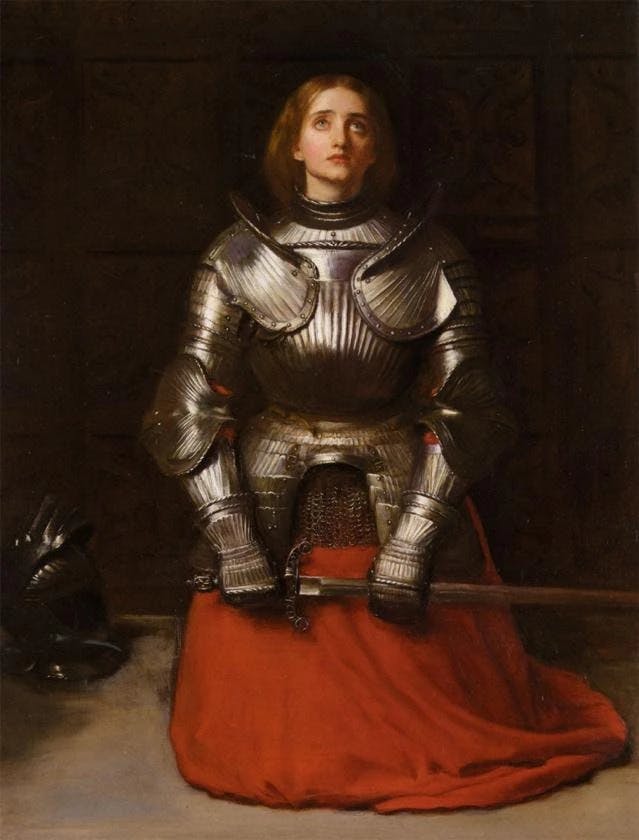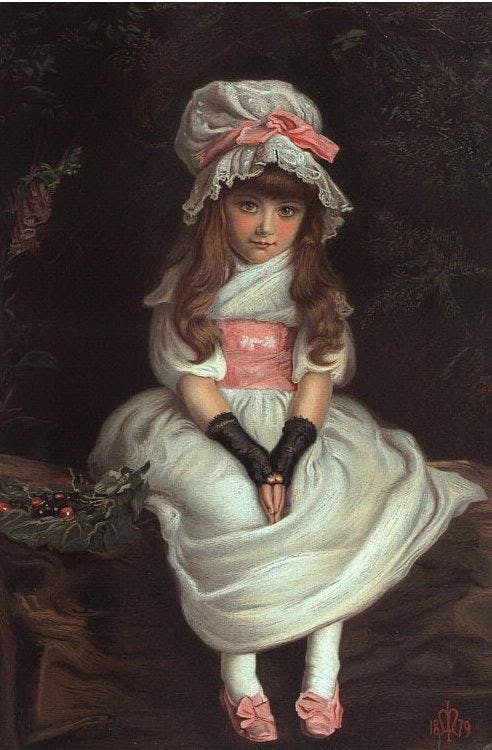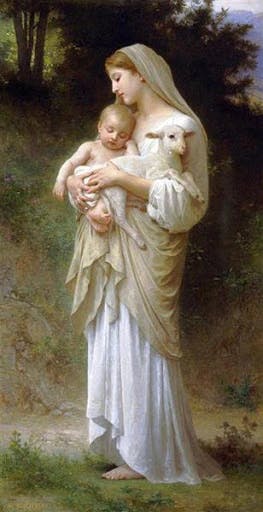Can A Woman Have A Hero Story?
"A man must become, but a woman simply is." What can Camille Paglia's famous quote teach us about the feminine hero story?

What does it mean to have a "hero" story? A hero is an archetypal ideal for a man. It’s the most athletic, capable, handsome, intelligent, and valiant version of a man. It’s an abstraction of every single good to which a man may aspire, combined in one mythic image that guides our actions. To approach this ideal is to have lived a good life as a man.
However, a common mistake that feminism makes appears in its insistence on finding the "female hero story." This broken ideology believes that just by putting the word "female" in front of something, it somehow becomes appropriate for the female spirit. This is far from the truth. Putting “female” in front of police officer only serves to highlight that perhaps women aren't naturally police offers, or scientists, or doctors, or lawyers. It’s uncommon to hear "she’s a female nurse" or "she’s a female babysitter" because these roles are so embedded in our collective psyche as being feminine jobs. What does this imply about the concept of "female hero"? That a hero isn’t innately a female pursuit.
Feminism believes that putting the word "female" in front of something makes it appropriate for the female spirit.
This leads us to more problems. There are decidedly many women in history who have accomplished "heroic" feats. Joan of Arc, Jhansi Ki Rani, Queen Elizabeth I, Catherine the Great, and the goddess Athena are all examples of great female heroes.

Joan of Arc, by John Everett Millais
Nevertheless, the common thread is that these female heroes are always celebrated because they’re instances when a woman accomplished great feats that otherwise would have been done by men. We’re impressed foremost because the feats are courageous, virtuous, and magnificent, and secondly because they are, uncommonly, done by a woman. This double applause is an absolute insult because it implies that women are only worth celebrating when they fulfill masculine archetypes.
Feminism is correct in that, historically, we celebrate men more often than women. It, however, seems to suffer no cognitive dissonance in continuing this pattern of celebrating the masculine only, as it continues to ignore and disparage those women who fulfill feminine archetypes with great valor and decorum.
What's the Feminine Hero Story?
This question itself is wrong. The hero story is masculine. Putting the word "female" in front of it does nothing to make it belong more to the feminine. When a woman fulfills this male story (like in the examples above), then they’re no longer feminine stories at all. The more appropriate question to ask is: What is the feminine ideal to which a woman may aspire?
There’s something important to address before we can approach this question with an intelligent response. What is it that makes the hero story masculine in the first place? This seems like a sexist idea that a man may have claim to a certain set of virtues or a certain type of story. The answer to this question is "A man must become, but a woman simply is" by Camille Paglia. This means that in order for a man to reach his ideal, he must craft himself from nothing. He must build himself up by undergoing hardship and trials. This concept of building is reflected in men's ideal body: it must be built. It can also be found in men's rites of passage that they must go through to become a man. Manhood is earned.
Women's main task is to preserve what they’re already endowed with by nature.
Women, on the other hand, don't need to build toward their ideal. Their main task is to preserve what they’re already endowed with by nature. This means they must take extra care not to traumatize or harm themselves.
(Please be mindful that in this entire discussion, I'm speaking of generalities and not of each specific individual person. The utility in studying generalities isn't so they will reliably apply to everyone but rather because they offer us principles to understand the behaviors of most people.)
What's the Evidence for Such a Bold Claim?
Let’s examine this by thinking about what an ideal woman does in her femininity that she can’t do by mimicking a man. The picture of the attractive young woman is one who still has the look of youth on her face: rosy cheeks, long hair, a healthy springy body, and a childish cheerfulness in her demeanor. A young woman doesn’t earn these things, she’s simply born with them. They’re God-given.
However, she has to exert great effort to keep them. She must take care of her health by eating nutritious food and exercising. She must have a wonderfully resilient heart in order to not have it tainted by the inevitable tragedies and heartbreaks of life. She must have been lovely enough to inspire those stronger than her to protect her and have been brave enough to trust them. Preservation is the main prerogative of her endeavors.
The divine feminine is the closest we can get to an analogy for the hero.
On the other hand, let’s think about the ideal man. He’s not a youth, or if he is, he’s a formidable and accomplished one. He has put his body through a rigorous and punishing regimen to become athletic and strong. He has overcome many challenges to achieve his status in society, earn money, and become excellent in some skill.
Women may also develop their skills, but they rarely do so to compete with other women and gain status, and more often the goal is for enjoyment of the skill itself as some kind of useful and joyful hobby. If it brings her joy to start a business with it, she can do that. She may even compete and win at high levels with her skill. But her status is hardly of primary concern when we consider her attractiveness to men, or more importantly, her feeling of satisfaction in life. When it comes to defining herself as a woman, winning status is hardly what makes her feel like she embodies the archetype of the divine feminine.
The divine feminine is the closest we can get to an analogy for the hero. She comes in many forms: the great beauty, the great mother, the wise one, the musician, the protector of her children, and many others. (These I largely draw from Hindu, Greek, and Christian mythology.) A woman who fulfills her divine archetype is not loudly celebrated as heroic men are, nor is she compensated with riches and power in the same way that men are. (This doesn’t mean that she isn’t rich or powerful.)
The Great Beauty
The great beauty is the female archetype that seems the most "undeserving" of praise or comparison to the masculine hero story. Why should a person be praised for that quality which was randomly given to them by fate? The reality is a woman who successfully cultivates her beauty must necessarily make it look effortless when it truly isn't.
The painting "Cherry Ripe" by John Everett Millais (1879), an accomplished pre-Raphaelite painter, captures the exact underrated skill of beauty that I wish to convey. The skill is in guiding the gaze of the viewer. In the painting, the little girl is positioned in a very proper and appealing way with her hands neatly folded and her dress and hair neatly laid out. There’s a look in her eyes, however, that has intrigued many art critics which is the look of her knowing that someone is watching her. She’s arranging herself to look beautiful for the viewer.

Cherry Ripe, by John Everett Millais
The painter is capturing the exact moment in a girl's life when she realizes that she’s beautiful, and that this beauty has power and influence over others. In order to capitalize on this power and, more importantly, not to be consumed or destroyed by it, she must be aware of it and understand its potency. The woman who can do this well avoids the sins of vanity and narcissism, which comprise the psychological illness of being consumed by one's own beauty.
Beauty is not merely a set of innate physical features. It’s poise, grace, and an attention to presentation in the loveliest way possible. Beauty, when cultivated properly, is unfathomably powerful. A beautiful woman can call others to protect her, help her, and fight for her. She can sell things more easily. People are more willing to forgive her and give her second chances. She has the benefit of the doubt and is more easily trusted. Great ekphrastic odes are written to this beauty; operas, epics, ballads, and paintings are dedicated the archetypal great beauty of a woman. Beauty is not earned, but rather just exists and must focus not to besmirch itself.
To capitalize on the power of beauty and not be destroyed by it, a woman must understand its potency.
Women go to great lengths to preserve this youthful beauty as best as they can as they grow old. However, these women are likely to be the ones who didn’t gracefully move on to the next stage of life. I hypothesize it’s because they didn’t use the potential of this youthful beauty when they had it. For example, if she didn’t find a husband, or appreciate it when she had it, then it may be difficult for her to accept that the time limit for this power has been reached. Different aspects of the divine feminine are suitable for different seasons of life.
The Great Mother
If the young woman is successful in preserving her innocence, beauty, and charm, then she may marry a great man and become a mother. Becoming a mother is not something she earns, rather, it’s something she preserves. For a woman to become a mother, she must preserve her health. The biological part of becoming a mother is something that’s already inside her, ready and waiting. She doesn’t need to earn warmth, love, and instinctual tending to the baby because these are instincts that she’s born with and must merely preserve by not allowing life to embitter her or make her too unhealthy to have children.

Innocence, by William Adolphe Bourgeau
Contrast the woman becoming a good mother with a man becoming a good father: he must earn the title. For a man to be a good father, he must be able to provide for his family and have developed the wisdom and intelligence to guide and protect his children. These aren’t virtues that a man is born with but rather are earned through training, action, and experience. Once again, for the woman to fulfill her archetypal ideal, she must preserve, whereas the man must earn.
The biological part of becoming a mother is something that’s already inside her, ready and waiting.
In the absence of a good man, the mother, of course, must take up the burdens of the man also. To do this, she must earn the qualities of being able to provide, lead, and protect, for these qualities can only be earned. In the process of taking on this dual role, she may sacrifice some elements of the divine feminine and become hardened as a mother. This inevitably affects the child. Single mothers are exemplary people who go through more hardship than most people. Nevertheless, in our admiration for this person's tenacity and strength of spirit, we shouldn't delude ourselves that a single mother is an ideal situation for a child to grow up in. The ideal is to have a good mother and a good father, each fulfilling their roles to the best of their ability.
Be Yourself
We’re reticent to speak about gender roles because they imply restriction in a culture that, at least semantically, appears to prioritize freedom. Even if every role were permitted to everyone, we would find that, because of the natural differences in the predilections, desires, and strengths between men and women, men and women gravitate toward different roles. The greatest lie that Enlightenment French philosophy has permitted to fester in the collective psyche is that we're born as a blank slate that we can write upon with sheer will alone. It’s the lie that denies our very nature.
The more effort you expend rejecting your natural desires, the less energy you will have to become the best version of yourself.
Nature isn’t an imperative directive about how to live, but it does determine what your innate desires are, and these are difficult to reject. The more effort that you expend living your life rejecting your natural desires, the less energy you will inevitably have to become the best version of yourself. When we attempt to be what isn’t our nature, we play a mediocre imitation at best and at worst squander the authentic version of ourselves.
Closing Thoughts
The female hero story is not a hero story at all. This is because at no point is it appropriate for a woman to measure her success by how good of a man she is, and this applies also to the archetypes she uses to frame her ideals. The female myth is about preservation and refinement of the divine feminine that she’s born with.